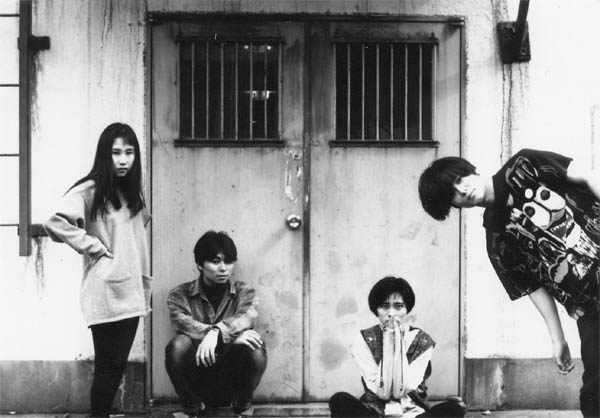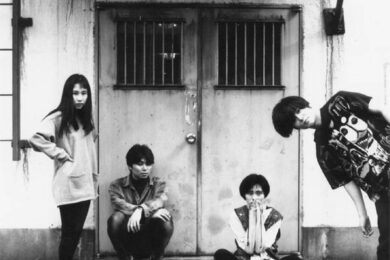In October of this year, Melt-Banana returned to the UK to play live. This, for me at least, was comforting news. The veteran Japanese act has been pinging around the world regularly for nearly 20 years now, and their arrival on these shores is always a popular draw. On a personal level, the first time I saw them in 2005 (I know, late starter) resulted in me vowing never to see any live music ever again, for the medium had reached its apogee in my eyes. That didn’t last, luckily, and subsequent shows every couple of years have always chimed resonantly with me. They are my favourite live band ever. The reason? Noise.
London’s Highbury Garage was the venue of 2005’s show. Unaware of how on earth this kind of music could even be performed (a bizarre parallel they share with Karlheinz Stockhausen), thoughts of how they might make such a brutally exact sound with only guitar, bass, drums and pixie shrieks distracted me from the moment I’d bought a ticket. I was destined for disappointment, obviously, having over-analysed and convinced myself that it was impossible for that sound to be satisfactorily deployed. Or so I thought.
In the event, it wasn’t the technique that was impressive, it was the way Melt-Banana used noise as a tool in their arsenal. Microscopic detail was framed by the cold sheath of silence, ringing through as the ultimate contrasting power to the utter violence of the sound. Noise as I knew it had become a rather rewarding science, something to pore over and assess for its successes.
Melt-Banana’s return is a time for celebration of a uniquely physical and, importantly, noisy band. Bizarrely, the prospect of such an aural assault is actually rather comforting – and that’s potentially a real problem. Has noise and violence in music – whether it’s precise like Melt-Banana or just plain aggressively sloppy like, say, Napalm Death – become de riguer? Can we no longer be shocked by the power of noise? Are we all just numb to it nowadays or something, for Chrissakes?!
Actually, Napalm Death are a good example. Grindcore legends such as those Brummie behemoths are now looked upon with wistfulness rather than the fear and confusion that they engendered when they crawled from the womb; a disfigured and ugly child of punk rock, syllabic riffs and urban decay. It’s so easy to forget that this music is not supposed to make us affectionate toward its creators. The same goes for countless others, from Electric Wizard to Extreme Noise Terror. What was once destructive and akin to partying with bigger, uglier boys has turned into a beneficial experience – noise as a simple and acceptable badge of moderate honour.
Examining the modern exponents of noise reveals a definite sway towards melodicism and digestibility. Volume (a very different beast to noise, and a whole other article in itself) is freely deployed to potentially destroy the innards of concert attendees, but noise itself has waned, warped and become something else. Fuck Buttons, Emeralds and Oneohtrix Point Never are all currently heralded, but there is little in them that could wantonly confuse, terrify or assault the listener in the way their reception has led us to believe. In fact, Quietus pilot John Doran has pointed out that Oneohnotrix Point Never’s latest release (the fine Returnal) begins with what could be interpreted as a joke on all those who’ve bought into this new and easier noise; ‘Nil Admirari’ is a proper noise-out with flaming breath and acrid approximations of tonality. A hideous, brilliant piece.
Fuck Buttons are possibly the most obvious examples when it comes to the new breed of noise. Again, it’s mostly volume. Much of their work revolves around mammoth passages of nigh-on-imperceptible growth in volume and texture, rather than anything that could be considered anywhere near as offensive as their name. There are perhaps only a few successful artists left that actually use noise as a weapon, such as HEALTH and Boris, for example. Of course, there will always be a healthy hardcore of noise artists that will be cited as leading lights, but they suffer from that same familiarity; the readiness to welcome noise with reverence reserved for something as innocuous as a tartan rug. Michael Gira, Merzbow, Jesu and Khanate have long since been established, digested and accepted. Impressive and noteworthy as they are, the result of this continuing comfort is detrimental to the progression of noise.
With the difference between the comfortable noise of now and the disgusting noise of before defined, it’s interesting to see a newer breed of artist emerging that occupy a surprisingly happy middle ground. HEALTH have already been mentioned, while closer to home, the anti-melodic meanderings of Rolo Tomassi have found a remarkably receptive audience. The most exciting prospects amongst this new noise are Canada’s mysteriously cold Women. Their second LP, Public Strain, acknowledges the power of noise, but impeccably pits it against dark melodies, obscured just enough to make you work for it. In fact, they use their unkillable tunefulness (Dick Dale guitars and bare vocal harmonies) as a springboard for something more confounding and something scarier. Dissonance and well-placed shocking noise works approximately a gazillion times better than the stately build-ups of Fuck Buttons or Emeralds (look to Mogwai’s ‘Like Herod’ for a warning from history), and Women are the very best at maximising the potential contrasts.
So now when I watch Melt-Banana, I will be happy. Not frightened; not nervous of any serious danger; but happy that they’re back. It has become easy to take solace in noise. This isn’t wrong, exactly, but it is increasingly difficult to be genuinely unsettled by its power alone. Familiarity explains the appeal of volume as a stopgap, but the future lies in the successful re-contextualising of noise’s innate power. Melt-Banana’s albums have always hinted at that deftness and control alongside their already-telepathic bursts, but they’ve yet to deliver the superhuman, dynamic recording they are capable of. Would it be too much to hope that they will produce this record in the coming years?
It would be nice to say that it’s unimportant as long as the live show is still majestic, but the desire to be challenged, beaten about the ears and petrified by what comes out of the speakers is key to the progression of noise. Whether that album comes or not, there are at least signs of progression and, hopefully, we won’t be comfortable for long. Who ever wanted easier listening, anyway?



